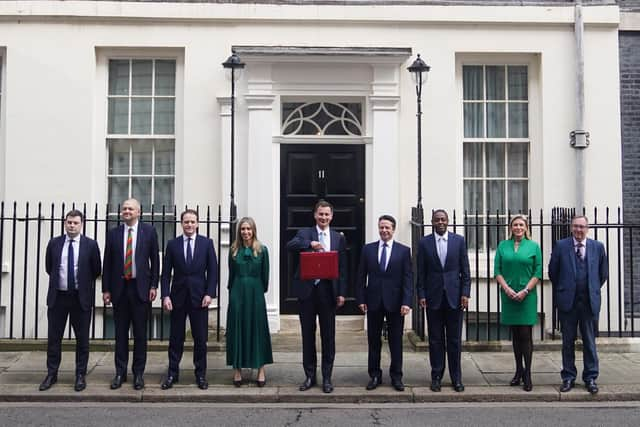We’ve descended into a place where political parties are look at ways of stitching up their opponents - David Blunkett
Such was the situation leading up to Wednesday's budget, but first I want to make a wider point about what's going on in British politics.
We are in a mess. We have degenerated into political parties looking at ways in which they can either stitch up their opponents, or make it so difficult for any incoming government, leaving no room for manoeuvre.
Advertisement
Hide AdAdvertisement
Hide AdIn simple terms, the government knows perfectly well what the future economic outlook means for both maintaining collapsing public services and the eye-wateringly difficult decisions that will have to be taken going into 2025.


Don’t take my word for it. Take the words of the Office for Budget Responsibility, or the Institute for Fiscal Studies. Before Wednesday, they had outlined the impact of the last budget statement back in November, which projected a £19bn cut in the most essential services, including the criminal justice system – which is, frankly, disintegrating as I write.
We've learnt recently of the enormity of the challenge facing local government. Councils of all persuasions are finding themselves effectively going bankrupt, and for upper tier councils responsible for social care the position is dire.
Telling them to increase their productivity, or stop funding diversity programmes is frankly risible.
Advertisement
Hide AdAdvertisement
Hide AdYou would have expected the Chancellor of the Exchequer to have presented himself and the government as honest and responsible custodians of the well-being of the country, which is what Jeremy Hunt attempted to achieve leading up to Wednesday.
The reality is somewhat different. Instead of choosing to restore some funding to collapsing services, he chose to placate his backbenchers with a £10bn giveaway. What would explain a 2p reduction of National Insurance in January of this year, followed by the announcement, in March, of another 2p reduction? Well, it's called a general election.
You may not have noticed, in fact, you were intended not to, but two valuable programmes were axed. The Household Support Fund, there to help the most disadvantaged, will cease at the end of September – saving the Chancellor half a billion pounds. The essential pupil tutoring programme to help catch up after Covid will be cut at the end of the summer term.
No such doubt about what comes first – the nation, or political opportunism – from someone you'd have expected to act in a mature and grown-up fashion.
Advertisement
Hide AdAdvertisement
Hide AdThere are now five different factions in the governing party, four of them intent on creating a new agenda.
More moderate voices, but fewer of them, understand that maintaining investment in public services is a prerequisite to growth and future productivity, have lost out.
Although he's getting no credit for it, the President of the United States, Joe Biden, has demonstrated this par excellence. Growth we can only dream of, reducing inflation and low unemployment.
All on the back of a massive investment programme brought about by the Inflation Reduction Act, which was code for billions of dollars of investment in infrastructure and recovery.
Advertisement
Hide AdAdvertisement
Hide AdBut what has happened over recent weeks and, in the budget, is driven by something else. Namely, the deterioration of society which is, in many ways, mirroring the deep divisions that have been seen in the United States.
Take the antics which took place two weeks ago in the House of Commons.
The Scottish Nationalists decided that voting on their motion relating to Gaza was more important than developing a consensus with some chance of providing influence over the situation from the UK.
Such division has now been exacerbated by the behaviour of George Galloway of the Workers Party, the winning candidate in Rochdale, nine days ago.
Advertisement
Hide AdAdvertisement
Hide AdThe more we trash the way in which we do our politics, the more damage we do to our democracy. The more that politicians behave purely in the interests of their own ‘tribe’, the more the electorate will be turned off politics and participation, including voting. It's a vicious cycle which, if we continue, will lead us down an incredibly dangerous road.
This is a moment when we need to unite as never before outside wartime, seriously address the many problems that surround us, and try to restore our damaged reputation abroad.
The clout we have, the ability to provide any contribution to key international issues and have a voice where it matters, are all dependent on whether people can take us seriously.
True patriotism is not to destroy the standing of your own country. True statesmanship is to transcend the siren voices – whether that’s from within your own party or from outside.
Advertisement
Hide AdAdvertisement
Hide AdIdentifying what really matters, and then trying to pull people together to find common solutions and, where possible, a consensus about the way forward, is what serious policymakers and heavyweight politicians should be all about.
I have not given up hope. I believe that the British people are far more savvy, and the majority are more responsible than some politicians give them credit for. I honestly believe that most people can see through the fog of ‘yah boo’ politics and do know what is genuinely in the interests of both themselves as individuals, and of the country as a whole.
David Blunkett is a Labour Party politician, and served as the MP for Sheffield Brightside and Hillsborough.
Comment Guidelines
National World encourages reader discussion on our stories. User feedback, insights and back-and-forth exchanges add a rich layer of context to reporting. Please review our Community Guidelines before commenting.